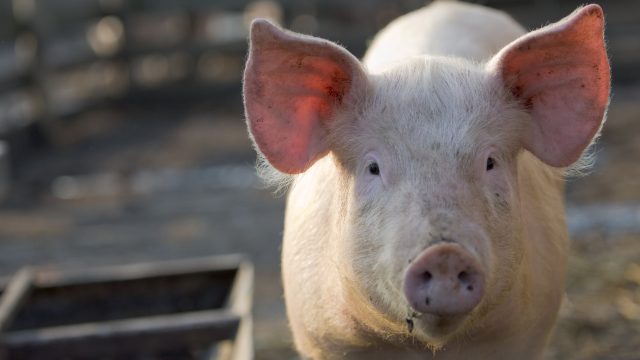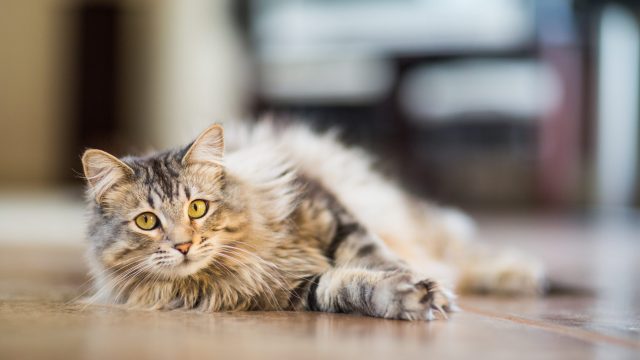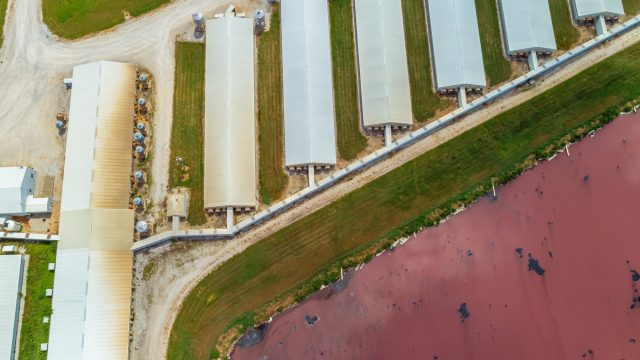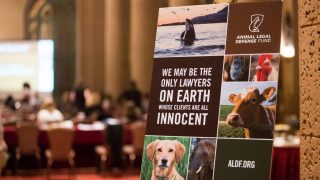
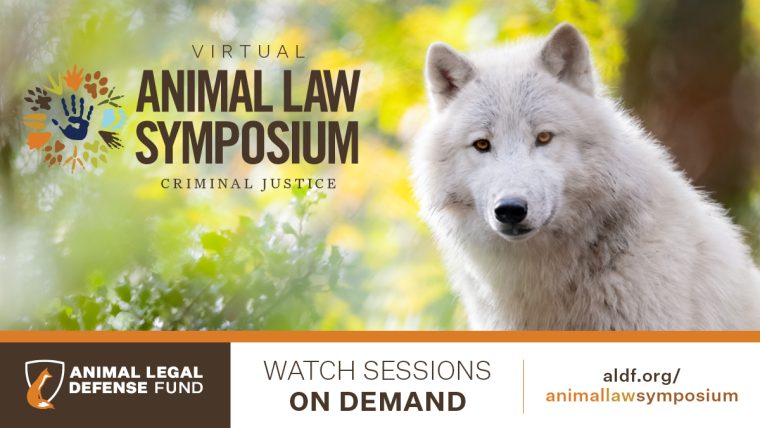
This two-day online event featured panels on animal cruelty prevention and investigation, courtroom animal advocate programs, groundbreaking new animal cruelty cases, and more!
Continuing Legal Education (CLE) credits: This year’s Animal Law Symposium: Criminal Justice has been approved for 6 CLE credits by the Florida State Bar Association, and 5 CLE credits by the Oregon State Bar Association. Most states accept credits from other mandatory CLE states such as Florida and Oregon, but please check with your local bar association to confirm.
Sessions
- Better Together: Animal Cruelty Investigation and Prevention through Collaboration
- An Animal’s Impact: Novel Approaches to Criminal Sentencing
- Appearing for The Animals: The Experience and Impact of The Nation’s First Courtroom Animal Advocate Program
- Justice & Jurisprudence: Three Animal Crime Case Victories
Session Details
Better Together: Animal Cruelty Investigation and Prevention through Collaboration
A collaborative approach to animal cruelty investigations relies on the successful interface between law enforcement, forensic veterinarians, animal sheltering entities, and prosecutors. Animal cases require each of these disciplines to understand and execute their unique roles with precision while also understanding the duty, constraints, and capabilities of each other in the context of the investigation and prosecution. Strong relationships between these entities can also result in positive outcomes for animals and people through access to services, education and support that circumvent animal suffering and criminal citation. This panel will discuss the Animal Legal Defense Fund’s Collaborative Response Project and the successes and progress made in one community through training, grant funding, and hands on support.
This presentation took place on May 5, 2023. Watch the full recording.
Speakers:
Emily Lewis
Emily Lewis is the Managing Attorney for the Criminal Justice Program at the Animal Legal Defense Fund. In her role, she supervises and facilitates assistance in active criminal cases, working directly with law enforcement agencies, prosecutors and rescue groups. She supports and trains front-line responders on search warrant drafting, evidence collection and preservation, and scene processing best practices.
Linda Fielder
As the Animal Cruelty Investigations Manager for the Animal Legal Defense Fund’s Criminal Justice Program, Linda Fielder provides prosecutors, law enforcement, veterinarians, animal control officers, and animal rescues with essential operational and forensic support on criminal animal cruelty cases. Linda leads extensive training of these entities on evidence collection, scene processing, veterinary forensics, and sheltering of protective custody animal victims.
Lora Dunn
As Director of the Criminal Justice Program, Lora Dunn leads a team of attorneys in assisting, training, and educating prosecutors, law enforcement, judges, veterinarians, and other key stakeholders throughout the country on animal cruelty cases. Under her leadership, the Criminal Justice Program expanded the breadth of its judicial trainings, including a first-of-its-kind formal partnership with the National Council of Juvenile and Family Court Judges, which resulted in the publication of the judicial bench book Animal Cruelty Issues: What Juvenile and Family Court Judges Need to Know.
Resources:
- Better Together: Animal Cruelty Investigation and Prevention through Collaboration – PPT (PDF)
- Animal Cruelty Investigations: A Collaborative Approach from Victim to Verdict, Wiley Blackwell Publishing
- Victim to Verdict Website
- Arizona Center for Problem-Oriented Policing: Responses to the Problem of Animal Cruelty
- National Link Coalition Toolkit
- U.S. Department of Justice Problem-Specific Guides Series: Animal Cruelty
- American Veterinary Medical Association: Practical Guidance for the Effective Response by Veterinarians to Suspected Animal Cruelty, Abuse and Neglect
An Animal’s Impact: Novel Approaches to Criminal Sentencing
Increasingly the public realizes that animals being subjected to criminal cruelty is a serious matter, deserving a response. The question remains, however, how to arrive at case outcomes that best address these crimes to achieve justice for the animals and the community? Conversely, are there lessons we can learn from the human-animal bond that can help create better outcomes in other cases? Exploring these questions with us are Animal Legal Defense Fund Managing Attorney, David B. Rosengard, and Deputy District Attorney, Jill Hollander, (Chief of Fulton County’s Crimes Against Animals Division). Rosengard will outline a new training program for criminal justice stakeholders that — by centering the experience of animal victims — builds nuanced sentencing packages that prioritize restoring victim well-being and preventing future crimes against animals. Hollander will discuss her work with Canine Cellmates, an innovative program that deploys an alternative sentencing model pairing individuals charged with certain felony crimes with unadopted shelter dogs and leveraging the human-animal bond to the benefit of all.
This presentation took place on May 5, 2023. Watch the full recording.
Speakers:
David Rosengard
As a Managing Attorney in the Animal Legal Defense Fund’s Criminal Justice Program, David Rosengard works with stakeholders across the criminal justice system to pursue justice on behalf of animal cruelty victims. One of his focus areas is amicus briefs, where he raises appellate-level arguments aimed at enabling courts to reach decisions that not only address the needs of the animals involved in individual cases, but to also better position animals as a whole within the law. David additionally helms the Animal Legal Defense Fund’s groundbreaking work helping animals who have been harmed by criminal cruelty achieve the legal status of crime victims, including efforts to expand Courtroom Animal Advocate Programs which allow pro bono attorneys and law students to act as counsel for those animal crime victims in court.
Jill Hollander
Jill Hollander is a career prosecutor who joined the Fulton County District Attorney’s Office in 2002. She is a graduate of Emory University’s School of Law and of Tufts University, from which she graduated cum laude. She is admitted to practice in the State of Georgia, the Georgia Court of Appeals and Supreme Court, and the Northern District of Georgia. Jill specializes in the areas of digital evidence-based prosecution, animal cruelty, abuse of disabled adults, and family violence, skill sets which have led to success in thousands of cases, many of them complex and high profile.
Jill has extensive litigation experience. She has served as a lead prosecutor on thousands of cases of varying degrees of severity and has a passion for seeking justice for those who cannot speak for themselves. She has served as Chief of the Crimes against Animals Division since 2010 and works with law enforcement and private agencies to prevent and prosecute animal cruelty. In 2021 she was named as the Deputy District Attorney over the newly formed Elder Abuse and Animal Cruelty unit of the Fulton County District Attorney’s office. Since receiving that appointment, she has conducted extensive citizen outreach regarding animal cruelty prevention, elder abuse, and the often overlooked link between the two.
Jill has been recognized for her skills and dedication to justice, receiving numerous awards from the Fulton County District Attorney’s Office. Jill received awards for “A Voice for Victims” in 2005 and special merit awards in 2015, 2016, and 2017, and was named “Trial Division Attorney of the Year in 2009 and “Employee of the Year” in 2018. Jill also was honored with the Association of Prosecuting Attorneys’ “Unity Award” in 2019. In 2022 Jill was honored with the “Leigh DuPre Award,” recognizing her commitment to the citizens of Fulton County.
Jessica Chapman
As a Criminal Justice Program Fellow, Jessica Chapman works with the department to address crimes against animals, partnering with stakeholders across the criminal justice system to resolve both the impetus and impact of animal cruelty.
Resources:
- An Animal’s Impact: Novel Approaches to Criminal Sentencing – PPT (PDF)
- Animal Legal Defense Fund Position Statement on Sentencing
- Animal Maltreatment: Implications for Behavioral Science, Lacey Levitt
- Impact of Prison-Based Dog Programs
- Restorative Justice and Empathy-based Interventions for Animal Welfare and Wildlife Crimes
Appearing for The Animals: The Experience and Impact of The Nation’s First Courtroom Animal Advocate Program
Six years ago, Connecticut enacted the nation’s first Courtroom Animal Advocate Program in the form of Desmond’s Law, enabling judges to appoint pro bono attorneys and supervised law students to advance the interests of justice by spotlighting the needs and experiences of animal victims in cruelty cases. Join University of Connecticut Associate Dean for Experiential Education and Clinical Professor of Law, Jessica Rubin, and University of Connecticut Animal Law Clinic Teaching Fellow, Tara Cooley, as they share their unparalleled perspective on CAAP laws and lay out what the results of their study of the impact of Desmond’s Law on animal crimes in Connecticut.
This presentation took place on May 6, 2023. Watch the full recording.
Speakers:
Jessica Rubin
Professor Jessica Rubin is the Associate Dean for Experiential Education, Clinical Professor of Law, and Director of the Animal Law Clinic at the UConn Law School. She was instrumental in creating Desmond’s Law, which allows Connecticut courts to appoint advocates—law students under supervision—in animal cruelty cases. She created UConn Law School’s Animal Law Clinic, a clinic through which students appear in state courts as advocates under Desmond’s Law. Professor Rubin actively supervises students and appears in court to advocate for justice in cases of animal cruelty. She is widely regarded as an expert in the field of animal law and is a graduate of Cornell University and Cornell Law School. Professor Rubin has taught in Istanbul, Turkey for the Open Society Foundation, and in Seoul, South Korea. In both locations, she supplemented her teaching activities with local stray animal rescue and relocation efforts.
Tara Cooley
Tara Cooley is the teaching fellow in the Animal Law Clinic at the University of Connecticut School of Law, where law students advocate animal cruelty cases under Desmond’s Law—the nation’s first courtroom animal advocate program law. She earned her JD from Golden Gate University and her LLM in Animal Law at Lewis & Clark Law School where she served as an associate editor of the Animal Law Review. Cooley served as a legal extern at East Bay Community Law Center, a law clinic of the University of California, Berkley, in the Health and Welfare Practice, where she assisted with community access to public benefits. She also served as a legal intern at the Animal Welfare Institute, where she researched states’ inclusion of pets in protective orders and animal cruelty as an element of human abuse. Cooley received the Animal Legal Defense Fund’s Advancement of Animal Law Scholarship, a Brooks Institute for Animal Rights Law and Policy Domestic Scholarship, and an Animal Legal Defense Fund National Justice for Animals Award.
Moderator: Kim Kelly
Kim Kelly is the Animal Legal Defense Funds’ Legislative Affairs Program Director. In this position, Kim works to develop and advance the Animal Legal Defense Fund’s key legislative initiatives to improve and create stronger animal protection laws. She received her Bachelors in English and Political Science from U.C. Berkeley where she was an Academic All-American and NCAA Division I Champion in Women’s crew. Kim was a merit scholar at Charleston School of Law where she received her JD.
Resources:
- Appearing for The Animals: The Experience and Impact of The Nation’s First Courtroom Animal Advocate Program – PPT (PDF)
- Desmond’s Law: A Novel Approach to Animal Advocacy
- Early Impressions of Connecticut’s Court Advocate Program for Animal Cruelty Cases
Justice & Jurisprudence: Three Animal Crime Case Victories
Due to the unique nature of crimes against animals, successfully responding to cruelty cases can involve being prepared to answer new legal questions—or find new utility for old techniques. This panel will explore how embracing this challenge can create better law for all. Deputy Prosecuting Attorney, Anne J. Phinney, will reveal how State v. Doll resolved a long-running question: how long can someone convicted of animal cruelty be banned from possessing an animal? Animal Legal Defense Fund Staff Attorney, Kathleen Wood, will explain how she untangled issues of personhood, victim status, and domestic violence in successfully urging the Washington Supreme Court to hold that animal cruelty committed during domestic violence is not a victimless crime. Legal Counsel, Will Lowrey, will discuss how Animal Outlook was able to use a venerable Pennsylvania law designed for human victims to ensure that cows subject to criminal cruelty in a dairy factory farm get their day in court.
This presentation took place on May 6, 2023. Watch the full recording.
Speakers:
Will Lowrey
Will Lowrey is the founder and Legal Counsel for Animal Partisan, a new legal advocacy organization focused on challenging unlawful conduct in animal agriculture and research. Prior to his current role, Will served as Legal Counsel for Animal Outlook, a national nonprofit farmed animal protection organization, where he divided his time between civil litigation and undercover investigations. Will has substantial experience using private complaint mechanisms to enforce criminal animal protection laws, has used public records law to expose animal cruelty, and has engaged in numerous lawsuits against the government and industrial agriculture, including cases involving administrative challenges, false advertising, public nuisance, and constitutional issues. Prior to joining Animal Outlook, Will clerked in the Superior Court of New Jersey, and interned with the Virginia Attorney General’s Animal Law Unit and the Animal Legal Defense Fund. Will taught the first Animal Law course at the University of St. Thomas School of Law and spends considerable time mentoring law students interested in the field. Before law school, Will worked a lengthy corporate career and in his free time, helped run several non-profits focused on a variety of animal issues. Will resides in central Virginia where he writes animal-related fiction books and serves as one of the resident caretakers for a small nonprofit sanctuary for formerly farmed animals.
Anne Phinney
Deputy Prosecuting Attorney Anne Phinney crafted the state’s argument in Washington state’s Doll case, which was ultimately successful in upholding as constitutional the trial court’s decision to permanently bar the defendant from possessing animals similar to his victim: Ebony, a neighborhood cat whom he deliberately shot with a .22 rifle, causing such severe injury that the veterinarian who treated Ebony ultimately administered humane euthanasia. Following a conviction for first-degree animal cruelty, the defendant argued that the animal possession ban included in his sentence amounted to a cruel punishment in violation of the federal and state constitutions. Phinney’s argument persuaded the appellate court that a lifetime possession ban fit the Washington State Legislature’s aim of reducing repeat incidents of cruelty; was proportional to — and fine-tuned to meet — the intentional and egregious nature of the criminal violence inflicted upon Ebony; and coincided with the state’s recognized ability to restrict relevant property rights in the face of criminal convictions. Phinney’s work in State v. Doll is not only impactful for animals in Washington but will also help other states resolve in the affirmative a critical question that had previously gone unanswered: whether animal possession ban sentences can be lengthy (even lifetime) when proportionate to acts of cruelty. Further, Doll reaffirms that animal cruelty laws fundamentally exist “‘not to protect animals as property of their owners, but to protect animals as living, feeling creatures’, regardless of whether they are wild or tame” — a powerful statement, in which the appellate court directly quoted Phinney’s argument on behalf of animals.
Kathleen Wood
As a staff attorney with the Animal Legal Defense Fund’s Criminal Justice Program, Kathleen Wood assists prosecutors, law enforcement, and legislators throughout the country to enforce and strengthen animal protection laws. In this role, Kathleen oversees the annual Animal Protection Laws Rankings Report which compares the various strengths and weaknesses of each state’s animal cruelty laws. Kathleen has also been instrumental in the creation of Animal Legal Defense Fund’s state-specific Farmed Animal Cruelty Prosecution Guides and representing the organization on the steering committee for the National Link Coalition. Kathleen lives in West Linn, Oregon with her partner and two cats, Penny and Robin.
Moderator: Kate Youssouf
As a Staff Attorney, Kate Youssouf addresses crimes against animals through amicus briefs, trial-level cruelty case support, and collaboration with veterinarian and mental health professionals across the country to resolve the impetus and impact of animal cruelty.
Conclusory remarks: David Rosengard
As a Managing Attorney in the Animal Legal Defense Fund’s Criminal Justice Program, David Rosengard works with stakeholders across the criminal justice system to pursue justice on behalf of animal cruelty victims. One of his focus areas is amicus briefs, where he raises appellate-level arguments aimed at enabling courts to reach decisions that not only address the needs of the animals involved in individual cases, but to also better position animals as a whole within the law. David additionally helms the Animal Legal Defense Fund’s groundbreaking work helping animals who have been harmed by criminal cruelty achieve the legal status of crime victims, including efforts to expand Courtroom Animal Advocate Programs which allow pro bono attorneys and law students to act as counsel for those animal crime victims in court.
Resources:
- Justice & Jurisprudence: Three Animal Crime Case Victories – Kathleen Wood PPT (PDF)
- Justice & Jurisprudence: Three Animal Crime Case Victories – Anne Phinney PPT (PDF)
- Justice & Jurisprudence: Three Animal Crime Case Victories – Will Lowery PPT (PDF)
- WA Supreme decision in Abdi-Issa
- ALDF amicus in Abdi-Issa
- WA Appellate decision in Doll
- PA Appellate decision in re Animal Outlook
How We Work
Related
-
Court Rules Texas Food Label Censorship Law is Unconstitutional
The law imposed unclear and vague standards on plant-based meat producers that violate the First AmendmentJanuary 29, 2026 Press Release -
State Animal Protection Laws Ranked: Oregon is #1, North Dakota #50
20th edition of ALDF state and territory ranking report highlights major advancements & trends in animal protection across the U.S.January 27, 2026 News -
Over 30 Organizations Urge USDA to Limit Federal Support for Manure Digesters
Hundreds of millions of dollars intended to cut energy costs have been funneled to costly manure digesters, benefitting the largest factory farmsJanuary 15, 2026 News

